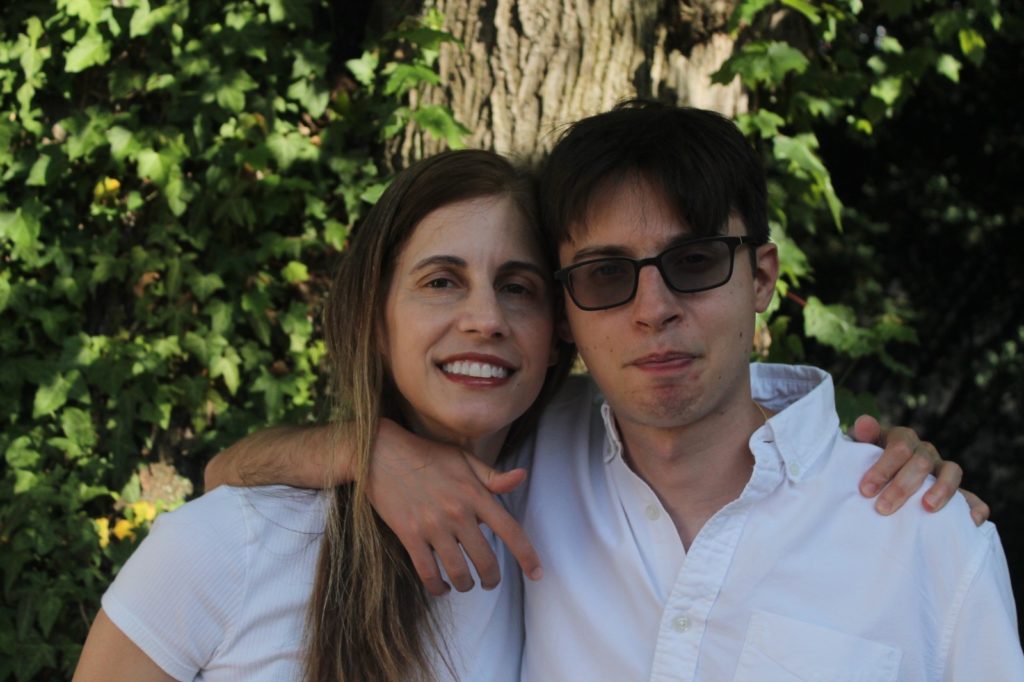
Autism, as defined in the DSM-5, involves “Persistent deficits in social communication and social interaction across multiple contexts.” My 26-year old autistic son, Diego, decidedly has immense difficulty sustaining lengthy back and forth communication, especially about topics he’s not passionate about.
He’s an expert, however, at breaking the ice and making small talk both with people he knows and perfect strangers. It’s a remarkable thing. Over the years, he has developed various formulas that are nearly 100% successful. Following are three of them.
1. Where-you-from, compliment and good day
We had about a quarter-mile to go on our run when Diego spotted a landscaping crew on the front yard across the street.
He stopped, took a few steps toward them and said: “Hi! I’m from here. Where you from?”
The three men looked up and one said, “Guatemala.”
Registering friendliness, Diego continued walking to the curb across the street -not a moment too soon, by the way, as he was standing right in the middle of the street.
“I’ve a book about Guatemala. There are volcanos in Guatemala,” he noted with delight.
“Yeah, they’re like triangles,” said the fellow.
Diego glanced at the man’s shirt, “I like your shirt. Jurassic Park, 1993.” Movie title and year is the way Diego invariably cites movies.
“Oh, that’s my favorite movie,” said the guy, smiling.
“The dinosaur eats the fat guy…,” Diego continued as I took his hand and told him we should get going.
With a wave and a “Good day, good day!” Diego took leave of the smiling men.
This recent exchange between Diego and three perfect strangers contains the classic elements of Diego’s most frequent technique:
- When people might come from somewhere else, begin with “I’m from here. Where you from?” Diego knows, for instance, that people with accents or in landscaping are usually not from here. Profiling is wrong, except when Diego does it.
- Show genuine interest in the place the interlocutor’s from. Say something specific about it.
- Give a compliment. Shirts always work.
- The shirt, or other complimented object, is the source of the next comment.
- Take leave with a beaming smile, a wave, and an original farewell. Diego always opts for “Good day. Good day!”
About shirts: Diego can instantly come up with a comment for any shirt. Say the shirt says Harvard, he might say, “My friend Owen and my cousin Fernanda live in Boston. I’ve been to Boston in November 2019.” If it’s a plain white shirt, he might say, “Nice shirt. I like white, like the clouds,” or “I like your white shirt. White like Snow White 1938.”
2. Happy-insert holiday, compliment, farewell
Diego and I went to the post office a couple of weeks ago to send some tax document “registered receipt” and buy two rolls of stamps for my husband, who markets his real estate services through mailings (you know, those envelopes you think everyone throws out).
Here’s the interaction between him and the post office clerk:
“Hi. Happy Fourth.” It was still June 26, but Diego begins observing holidays 10 days ahead.
“Yeah, it’s coming up,” she said.
“Next Friday,” Diego specified. “I like your shirt.”
“I like your lion,” said the lady, referring to the lion shirt Diego was wearing. “I saw the Lion King on Broadway. Did you see it?
“I saw it in 2003.” Diego’s our ready reference for information about dates: What year did Nonno die? (2008) What years did we go to Italy? (2003, 2005, 2007 and 2012)
Post office lady then said, “I saw the Wizard of Oz, How about you?”
Never one to say no, Diego replied, “I saw Mamma Mia and Frozen.”
I was done paying and it was time to go, but the lady took the time to further comment, “Oh, I’d love to see Mamma Mia.”
With his wave and smile, Diego wrapped up the interaction, “Happy Fourth! Good day!”
3. Talk to the interlocutor’s life and interests, and let them know you miss them
Here are some things Diego typically says during his daily conversations with nonna, who lives in Venezuela. I can only hear what Diego says, of course.
“Ciao nonna, come stai?” (Hi Nonna, how are you?)
“Ho mangiato la pasta.” (I ate pasta.)
“How’s Monica? How’s Carmela?”
“What have you been watching on TV?”
“Nonna, come visit me. Come live in the United States with me.”
This formula is reserved for people Diego knows, and these are its three basic elements:
- If the person speaks another language, such as nonna (Italian) or Abuela (Spanish), he’ll do his best to use as many words as possible in their native language. Diego is fluent in Spanish, so he has little trouble there. His Italian is limited, but when he calls nonna, he says every work he knows in Italian, even if out of context. Take a listen to his 10-second 80th birthday message to nonna!
- Diego always inquires about the individual’s loved ones, and specific job or interests.
- Every time, he tells people he’d love to see them, to please come visit, or better yet, to come live with us at our house.
In addition to autism, Diego has an intellectual disability, but you’d be surprised how much anyone could learn from his original mind and perfectly loving heart.

